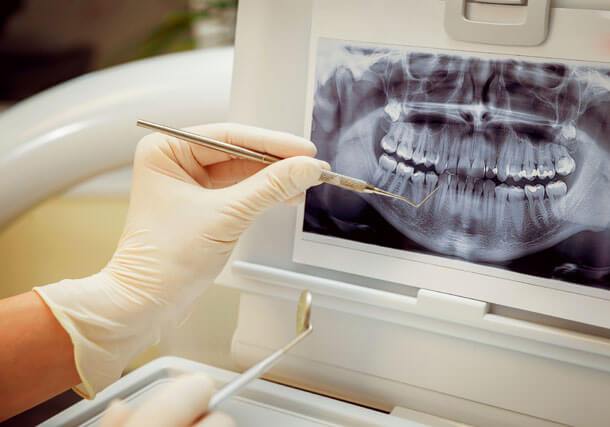Oral Surgery/Extractions


If a tooth has been broken or damaged by decay, we will first try to fix it with a filling, crown or other treatment. Sometimes, though, there’s too much damage for the tooth to be repaired. In this case, the tooth needs to be extracted. A very loose tooth also will require extraction if it can’t be saved, even with bone replacement surgery (bone graft).
When you talk to an oral surgeon – and anyone on our staff – you’ll find a highly caring and knowledgeable individual who will answer all your questions about tooth extraction services and review the best options for your dental care. So schedule a free consultation today and learn how we can make you smile.
About Tooth Extractions
Who needs this?
f you’re experiencing dental discomfort, you may need a tooth removed. Here are some reasons for the discomfort and to have your tooth removed:
- You have extra teeth that block other teeth from coming in.
- Sometimes baby teeth don’t fall out in time to allow the permanent teeth to come in.
- If you’re getting braces, you may need teeth extracted to create room for the teeth that are being moved into place.
- People receiving cancer drugs may develop infected teeth because these drugs weaken the immune system. Infected teeth may need to be extracted.
- Some teeth may need to be extracted if they could become a source of infection after an organ transplant.
- Wisdom teeth, also called third molars, are often extracted either before or after they come in.
The Process
There are two types of extractions:
- A simple extraction is performed on a tooth that can be seen in the mouth. General dentists commonly do simple extractions. In a simple extraction, the dentist loosens the tooth with an instrument called an elevator. Then the dentist uses an instrument called a forceps to remove the tooth.
- A surgical extraction is a more complex procedure. It is used if a tooth may have broken off at the gum line or has not come into the mouth yet. Surgical extractions commonly are done by oral surgeons. However, they are also done by general dentists. The doctor makes a small incision (cut) into your gum. Sometimes it’s necessary to remove some of the bone around the tooth or to cut the tooth in half in order to extract it.
- Most simple extractions can be done using just an injection (a local anesthetic). You may or may not receive drugs to help you relax. For a surgical extraction, you will receive a local anesthetic, and you may also have anesthesia through a vein (intravenous). Some people may need general anesthesia. They include patients with specific medical or behavioral conditions and young children.
- If you are receiving conscious sedation, you may be given steroids as well as other medicines in your IV line. The steroids help to reduce swelling and keep you pain-free after the procedure.
- During a tooth extraction, you can expect to feel pressure, but no pain. If you feel any pain or pinching, tell your doctor.
Common reasons for tooth extraction include:
Tooth that is too badly damaged, from trauma or decay, to be repaired.
Tooth infection that is so severe that antibiotics or rootcanal treatment do not cure it, extraction may be needed to prevent the spread of infection.
Periodontal (Gum) Disease can cause loosening of teeth, necessitating removal of teeth.
To minimize teeth crowding
What to Expect With Tooth Extraction
Before removing your tooth, we will give you a localanesthetic to numb the area where the tooth will be removed.
After the tooth is removed, you may need stitches. You cangently bite down on a cotton gauze pad placed over the wound to help stop the bleeding. The removed tooth can be replaced with an implant, a denture, or a bridge.
What To Expect After Surgery
In most cases, the recovery period lasts only a few days. The following will help speed recovery:
- Take painkillers as prescribed.Apply an ice or cold pack to the outside of your mouth to help relieve pain and swelling.
- After 24 hours, rinse your mouth gently with warm salt water several times a day to reduce swelling and relieve pain.
- Change gauze pads before they become soaked with blood.
- Relax after surgery. Physical activity may increasebleeding.
- Avoid smoking.
- Eat soft foods, such as gelatin, pudding, or a thin soup. Gradually add solid foods to your diet as healing progresses.
- Do not lie flat. This may prolong bleeding. Prop up your head with pillows.
- Avoid rubbing the area with your tongue.
- Do not use sucking motions, such as when using a straw to drink.
- Continue to carefully brush your teeth and tongue.
- After the tooth is removed, you may need stitches. Some stitches dissolve over time, and some have to be removed after a few days. We will tell you whether your stitches need to be removed. Call our Reading Dental Associates today at 781-944-6761 and make an appointment for a wisdom tooth extraction. We also serve other nearby communities like Reading, North Reading, wilmington, Wakefield, Stoneham, Lynnfield and Woburn.